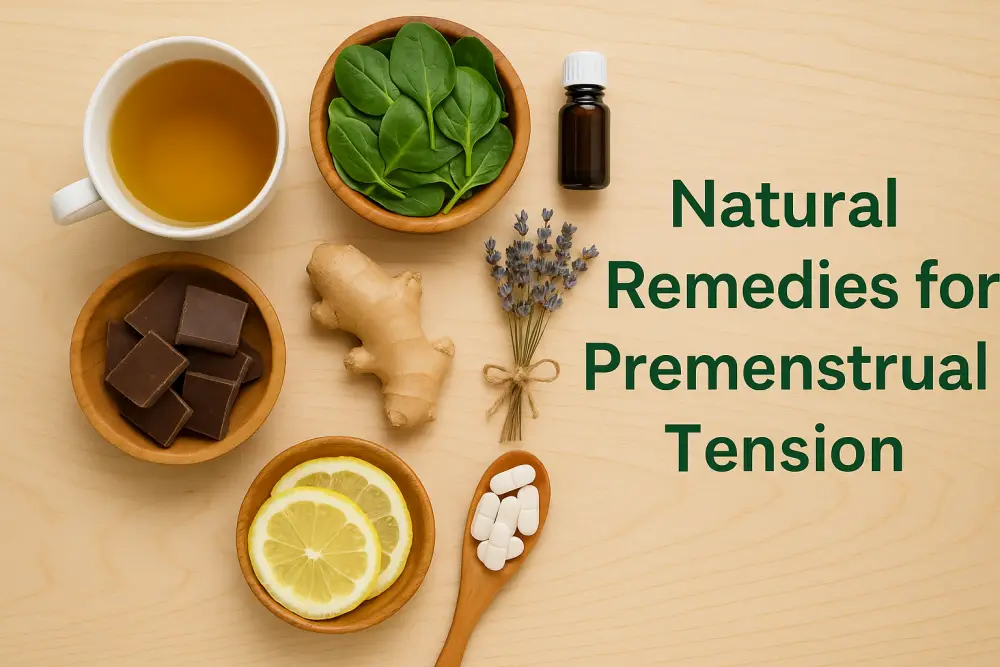If you often feel moody, bloated, or just not yourself before your period, you’re definitely not alone. Premenstrual Tension (PMT), also known as Premenstrual Syndrome (PMS), affects many women around the world. While some turn to medication, others prefer natural remedies for premenstrual tension to relieve symptoms in a more holistic way. In this article, we’ll explore easy and effective remedies you can try at home, supported by both tradition and science.
Why Consider Natural Remedies for Premenstrual Tension?
Many women prefer natural approaches because they focus on lifestyle and gentle healing rather than pharmaceuticals. These remedies aim to balance your hormones, reduce stress, and improve overall well-being—without heavy side effects.
1. Herbal Teas for Relaxation
One of the most popular natural remedies for premenstrual tension is herbal tea. Chamomile, ginger, and peppermint teas can ease cramps, reduce bloating, and calm your mood. For example, sipping a warm cup of chamomile tea before bed can help you sleep better and lower irritability.
2. Exercise and Gentle Movement
You don’t need an intense workout to feel the benefits. Light exercise, like yoga or walking, can increase blood circulation and release endorphins—the body’s natural mood boosters. A 20-minute yoga session focusing on stretching your lower back and hips may significantly reduce cramps and tension.
3. Balanced Nutrition
Your diet plays a big role in how you feel. Cutting back on caffeine, sugar, and salty foods can reduce bloating and mood swings. Instead, add magnesium-rich foods such as spinach, nuts, and dark chocolate. Omega-3 fatty acids from salmon or chia seeds can also support hormonal balance and reduce inflammation.
4. Stress Management Techniques
Stress can make PMT symptoms worse. Practices such as meditation, deep breathing exercises, or journaling can help keep your mind calm. Even five minutes of mindful breathing during a stressful day can reduce anxiety and lift your mood.
5. Natural Supplements
Some women find relief from supplements like vitamin B6, calcium, and magnesium. These nutrients are believed to reduce irritability, fatigue, and muscle tension. However, it’s always a good idea to consult with a healthcare professional before starting any supplement routine.
6. Aromatherapy
Essential oils such as lavender, clary sage, and rosemary are often used in aromatherapy for relaxation. Adding a few drops to a diffuser or mixing with carrier oil for a gentle massage can ease stress and improve your overall sense of well-being.
Final Thoughts
While PMT can feel overwhelming, incorporating natural remedies for premenstrual tension into your routine may help you regain balance and comfort. From herbal teas and light exercise to mindful stress management, these remedies offer gentle, effective ways to improve your emotional and physical health. Every woman is different, so it may take some trial and error to discover which natural approach works best for you. Remember, listening to your body is the first step toward feeling better.
FAQs About Natural Remedies for Premenstrual Tension
1. What are the best natural remedies for premenstrual tension?
Some of the best natural remedies for premenstrual tension include drinking herbal teas like chamomile and ginger, practicing light exercise such as yoga, eating magnesium-rich foods, and using aromatherapy with essential oils like lavender.
2. Can diet help with premenstrual tension?
Yes! A balanced diet can make a big difference. Reducing caffeine, sugar, and salty foods helps minimize bloating and irritability, while adding foods rich in magnesium, calcium, and omega-3s can support hormone balance and reduce PMS symptoms.
3. Do supplements work for PMS and PMT?
Supplements such as vitamin B6, magnesium, and calcium are often used as natural remedies for PMS and PMT. They may reduce fatigue, mood swings, and muscle tension. However, it’s always best to consult with a healthcare provider before starting new supplements.
4. How does exercise help with premenstrual tension?
Exercise releases endorphins—your body’s natural “feel-good” hormones. Even a short walk or 20 minutes of yoga can improve mood, ease cramps, and reduce stress during the premenstrual phase.
5. Are natural remedies safe for everyone?
Most natural remedies are safe, but every woman’s body is different. If symptoms are severe or disruptive, it’s best to combine natural remedies with professional medical advice. Consulting with a doctor ensures safe and effective care tailored to your needs.

